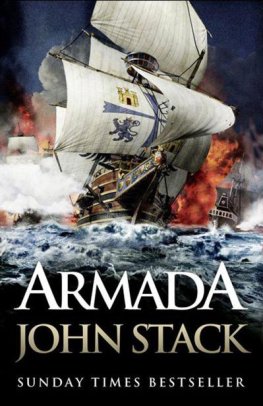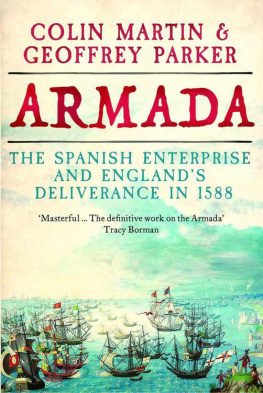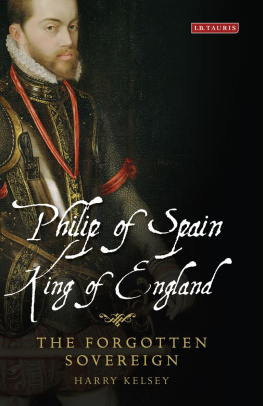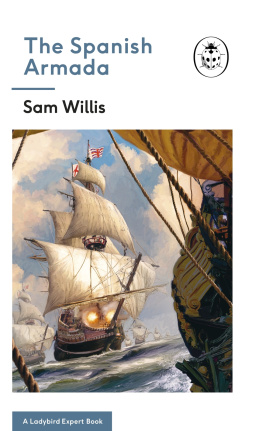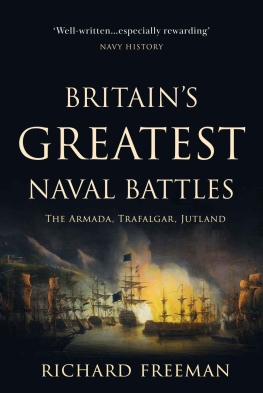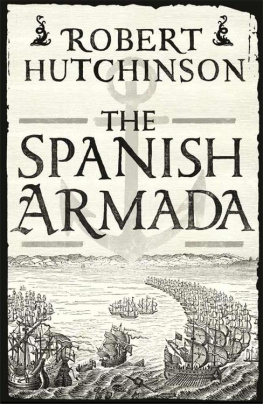The English Armada
To Demetrio Daz Snchez
My philosophy teacher,
My generous and wise friend,
Who showed me the path of the winged horses.
The English Armada
The Greatest Naval Disaster in English History
Luis Gorrochategui Santos
Translated by Peter J. Gold
Bloomsbury Academic
An imprint of Bloomsbury Publishing Plc

It was great providence and a miracle of the Lord
that the enemy came not directly to Lisbon without first attacking Corunna
for they would otherwise certainly have taken the town.
Relacin de la venida de Don Antonio de Portugal prior de ocrato con la Armada de la Reyna de Inglaterra en el ao de 1589. BN mss 1749, fol. 226.
Contents
(Please note: Maps 18 were drawn by the author. Maps 4 and 5 are referred to in Flix Estrada Gallardo, Datos para la confeccin de un atlas histrico de La Corua, Revista del Instituto Jos Cornide de EstudiosCorueses, No. VVI, Corunna, 196070.)
There are several people, companies and institutions that have assisted me in the long process that has culminated in this book.
For the Spanish version, I would like to thank the Ministry of Defence as joint publishers; the Institute of Naval History and Culture in Madrid, especially Captain Jos Mara Madueo Galn for his perseverance; the historian Jos Cervera Pery, member of the Royal Academies of History and of the Sea, for his prologue; the staff of the Simancas Archive in Valladolid, the National Library, the Royal Academy of History and the National Library of Portugal, who all placed their professionalism at my disposal to assist me with difficult searches; the historian Jos Luis Casado Soto, former director of the Cantabrian Maritime Museum in Santander, for his inspiration and support from the outset; Colonel Jos Navas Ramrez-Cruzado, former director of the Military Museum in Corunna, for his enthusiasm and the magnificent model of the galleon San Juan; Felipe Peces, Canon Archivist at Sigenza Cathedral in Guadalajara, for showing me the banners captured in combat; Jos Antonio Sols Miranda, of the publisher e-lector, for the joint publication of the book; to my sisters Beatriz, Raquel and Marta for their technical and graphic support; the Museum of Lisbon (Gabinete de Estudos Olisiponenses); the Palace of El Viso, Ciudad Real; the Cerralbo Museum, Madrid; the Naval Museum, Madrid; the Royal Palace Library, Madrid; the Rijksmuseum, Amsterdam; the National Trust Collections and the National Martime Museum, London; Bilbao council; Corunna council; the council of Monforte de Lemos; the University of Seville; Kronos Servicios de Restauracin (Kronos Art Restoration Service); Yago Abilleira Crespo; Carlos Fernndez-Cid, Carlos Picallo, Jos Martnez Rodrguez and Wikimedia Commons for the illustrations.
For the English edition, I would like to thank Bloomsbury Academic Division and especially Emily Drewe and Beatriz Lpez for their courage and judgement in accepting the values of the text even though it challenges well-established conventional positions; Lorcan McNamee, Ana Eiroa, Manuel del Campo and Antn Corriente for their advice and enduring friendship; Professor Peter Gold, for tackling with precision and energy the difficult task of translation.
And of course to all my family, especially Ana and our daughters Nerea and Diana, who for ten years have stoically endured life with someone who has been permanently living in the spring of 1589.
There is a discrepancy of ten days between the dates on the original English documents and the Spanish ones. This is due to the fact that England had not yet adapted its calendar at this period. The current Gregorian calendar is used throughout this work.
The translator is responsible for the translations into English of quotations from Spanish or Portuguese sources.
Between July 1588, when the Spanish Armada (the so-called Invincible Armada) set sail from Spain, and July 1589, when the remnants of its English counterpart (the little-known English Armada) returned to England, there occurred two of the greatest naval catastrophes in history. Since the time of the Spanish Armada until the present day, much attention has been paid to this event and over time it has become one of the defining moments in the history of Europe. However, no attention has been given to the English Armada, or rather, the attention that has been given to it has been to conceal it and as a result it has completely disappeared from history. Yet, remarkably, the English disaster of 1589 was greater than the Spanish one that took place the year before. Such a puzzling situation leads us to consider the nature of such defining moments in history. How do they happen? How do they develop? What is their purpose? And especially, how is it possible that two such similar episodes have received such unequal treatment?
The attention paid to the defeat of the Spanish Armada was entirely commensurate with the fear that was generated in England (still a relatively minor power) by the threat of a substantial invasion by the leading power of the age. This threat came not only from the sizeable army that the Spanish Armada was transporting, but also because it was under orders to escort the Tercio.
The English Armada was Englands counteroffensive. The size of it is striking given Englands limited resources at the time. But Elizabeth was aware that it offered a unique opportunity. In order to take advantage of it, she put the crown in hock and signed up shipowners, noblemen and merchants in that ill-fated venture. The strategy was quite clear: exploit to the full Philips temporary weakness, given that twenty-eight ships had been shipwrecked off the coasts of Scotland on its return from the West Indies and satisfy Englands great unfulfilled dream. This would lead to the collapse of Philips huge empire and enable England to take over the ocean routes discovered by Spain.
The English Armada failed, but the treatment that its failure received was, from the outset, totally different. Neither country viewed the defeat of the other as one of the greatest triumphs in its history. No one went from terror to euphoria, because in 1589 Spain was suffering from grief and frustration. At that time there was no prominence given to the Spanish victory in Corunna, the first port attacked by the English Armada and where part of the Tercio regiment returning from the Spanish Armada had been stationed in order to defend it. It is true that the English had been mercilessly driven out and had suffered thousands of casualties, both dead and wounded. But once they had left, all that could be seen was that the lower part of the small city was nothing more than a smoking ruin and that the population had endured great suffering. Victory in Lisbon was merely a great citys resistance to a brief attempted siege, with the besieged army later repelling the attackers themselves and forcing them to take to their ships again with considerable losses. The victories at sea were brilliant and particularly humiliating and damaging for an English Armada routed and in retreat. But they were only minor victories, because there were no all-out battles nor could there be, with the Spanish naval fleet still under repairs (albeit well-advanced) following the storm-ridden return of the Spanish Armada. Philips spies promptly reported on the major disaster that Elizabeth had suffered and the King breathed a sigh of relief after having overcome those difficult months in 1589 when Spain was virtually devoid of deployable ships. Philip vigorously re-engaged in war and strengthened his navy so that it reached an unprecedented level of power in the Atlantic. Drakes raids were dealt with once and for all, for when he tried to undertake them once more with a powerful fleet, all he encountered was defeat and death. However, no one embarked on a propaganda campaign, no one tried to highlight the fact that the Spanish project had survived a moment that was as critical as Englands months earlier. No one talked up the fact that the Hispanic presence in the world had just been born again.


